10 Surprising “Healthy” Foods That Could Be Packing on Pounds, Dietitians Say

Finding nutritious foods at the grocery store is more complicated than ever. Unfortunately, just because a product has a health claim on its label—like low-fat, organic, gluten-free, or plant-based—that doesn’t necessarily mean it’s good for you. What’s more, a lot of these “healthy” foods can actually be full of added sugars, saturated fat, and empty calories, all of which can lead to unintended weight gain. To make sure you’re not falling victim to these sneaky items, we consulted dietitians and nutritionists to find out the worst offenders.
RELATED: 8 Surprising Reasons You’re Not Losing Weight—And How to Fix Them.
1
Coconut oil

With so much talk lately about the dangers of seed oils, many people are turning to alternatives, including coconut oil. However, this might not be the best choice for your waistline.
Harvard Health Publishing notes that coconut oil consists of about 90 percent saturated fat, “which is a higher percentage than butter (about 64 percent saturated fat), beef fat (40 percent), or even lard (also 40 percent).”
“One tablespoon of coconut oil has 121 calories and 13 grams of fat, and 11 of those grams are saturated fat,” adds Dawn Menning, RD, a registered dietitian and the program director for digital health at Nutu App.
To put this in context, according to the U.S. Department of Agriculture (USDA) 2020-2025 Dietary Guidelines for Americans, it’s a good idea to limit your saturated fat intake to less than 10 percent of your total calories each day.
“This means that someone consuming 2,000 calories per day should have no more than 20 grams of saturated fat each day,” explains Menning. “The American Heart Association has an even narrower recommendation of six percent of total calories from saturated fat, which is about 13 grams of saturated fat for the same 2,000 calories per day.”
Not only can coconut oil’s high saturated fat content cause the number on the scale to creep up, but it can also raise your cholesterol.
2
Veggie chips

Who doesn’t love a good, old-fashioned potato chip? But since we know they’re not good for us, many of us will substitute them with veggie chips—a move that could actually be just as bad.
“Veggie chips may seem like a healthier alternative to traditional potato chips, but most are high in fat, calories, and sodium,” says Trista Best, RD, a registered dietitian with Balance One Supplements.
As Best Life previously explained, some brands of veggie chips don’t even have any real vegetable content, negating the nutrition claims.
“For a better alternative to traditional potato chips, opt for those made without added oil or salt, and preferably baked, which reduces the empty calories from fat,” recommends Best.
3
Granola and protein bars
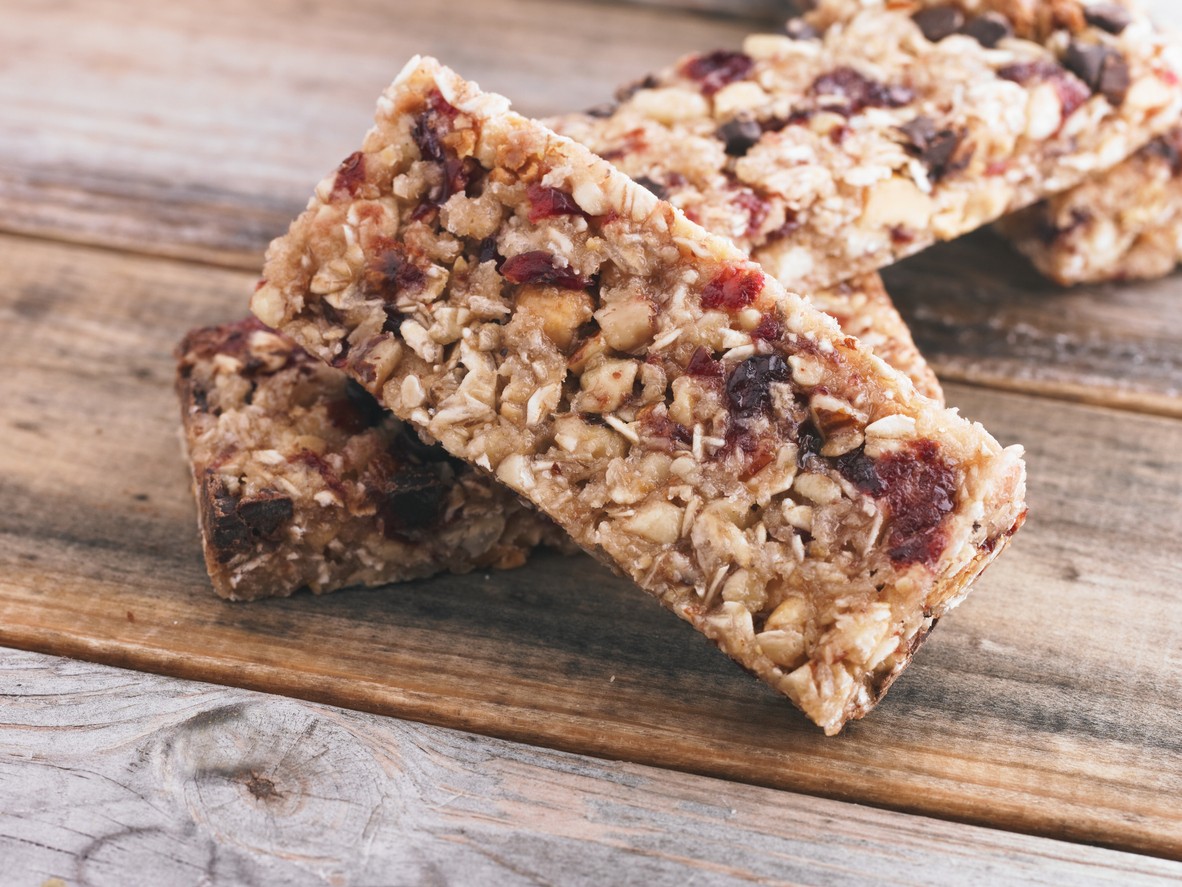
Pre-packaged granola and protein bars are another common source of saturated fat.
“If the protein bar is made with palm kernel oil (made of 85 percent saturated fats), then the saturated fat content will be higher,” Menning says. “For example, a 200-calorie protein bar could have three to four grams of saturated fat, which would provide approximately 14 percent of the calories.”
Additionally, Best adds that these bars are “often high in added sugar, fat, and calories while being low in important nutrients like fiber, whole grains, and protein.”
“Instead, look for bars made with as few ingredients as possible, whole grains, little or no added sugar, and high in fiber and protein,” Best suggests. You can also try making your own!
4
Full-fat Greek yogurt

Greek yogurt is an excellent source of protein, calcium, B vitamins, probiotics, and selenium. It can improve bone health, support gut health, build muscle, and more.
“However, the full-fat version may pack a high amount of saturated fat,” says Catherine Gervacio, RD, a registered dietician and nutrition writer for Living.Fit. “One serving (about 240 grams) can contain up to 6 grams of saturated fat, which is about a third of the recommended daily limit.”
The good news? You don’t have to cut out Greek yogurt entirely.
“For those watching their fat intake, opting for low-fat or non-fat Greek yogurt can offer similar health benefits without as much saturated fat,” says Sarah Pelc Graca, a certified nutrition coach, NASM-certified personal trainer, and the owner and head coach at Strong with Sarah Weight Loss Coaching.
5
Flavored yogurt
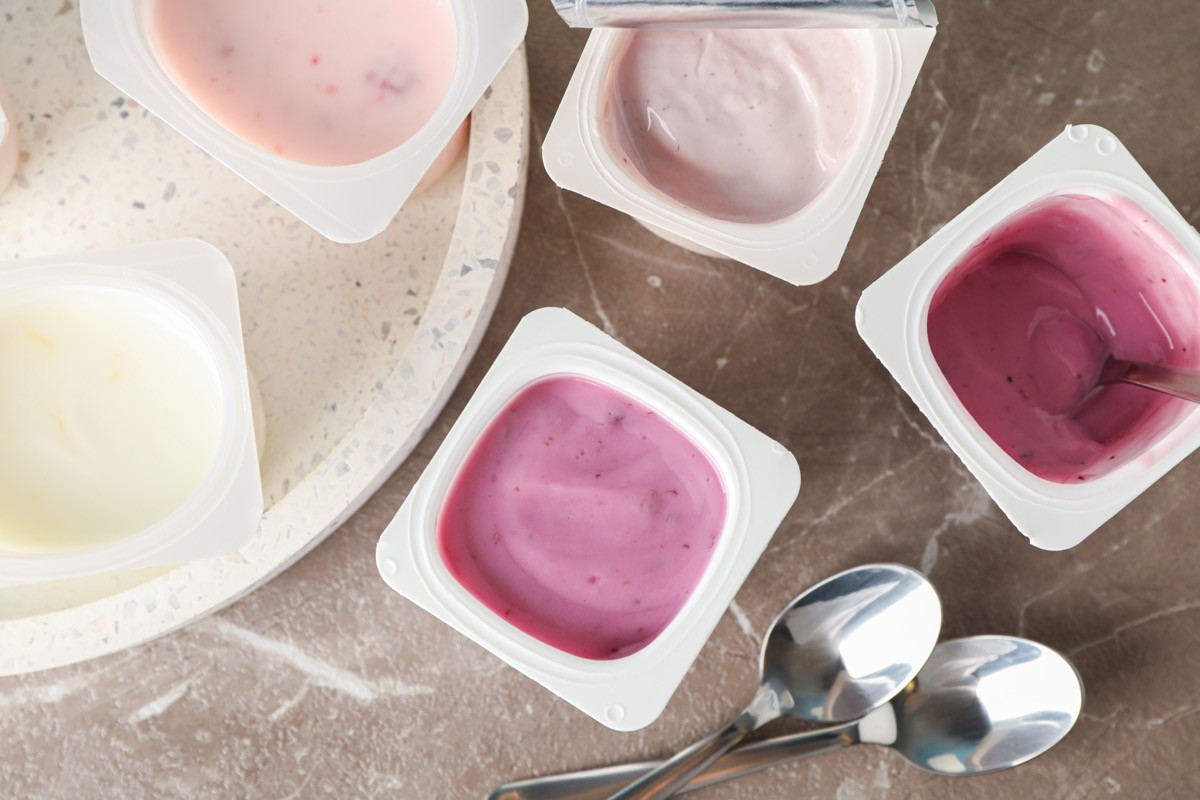
Another offender in the yogurt space is those that are flavored or have add-ins.
“Yogurt can be a healthy food, but flavored yogurts tend to be higher in added sugar,” Best explains. “This primarily comes from the fruit-on-the-bottom options, which are largely made with artificial flavors and a small amount of fruit in syrup.”
In fact, a 2019 study published in the journal Current Developments in Nutrition noted that flavored yogurts contained on average nearly twice the amount of sugar compared to their unflavored counterparts.
Added sugars are associated with increased risk factors for several chronic health conditions, including heart disease, diabetes, obesity, high blood pressure, cognitive decline, and cancer.
“A healthier option would be to purchase plain yogurt and sweeten it yourself with fruit or honey,” Best suggests.
6
Gluten-free products
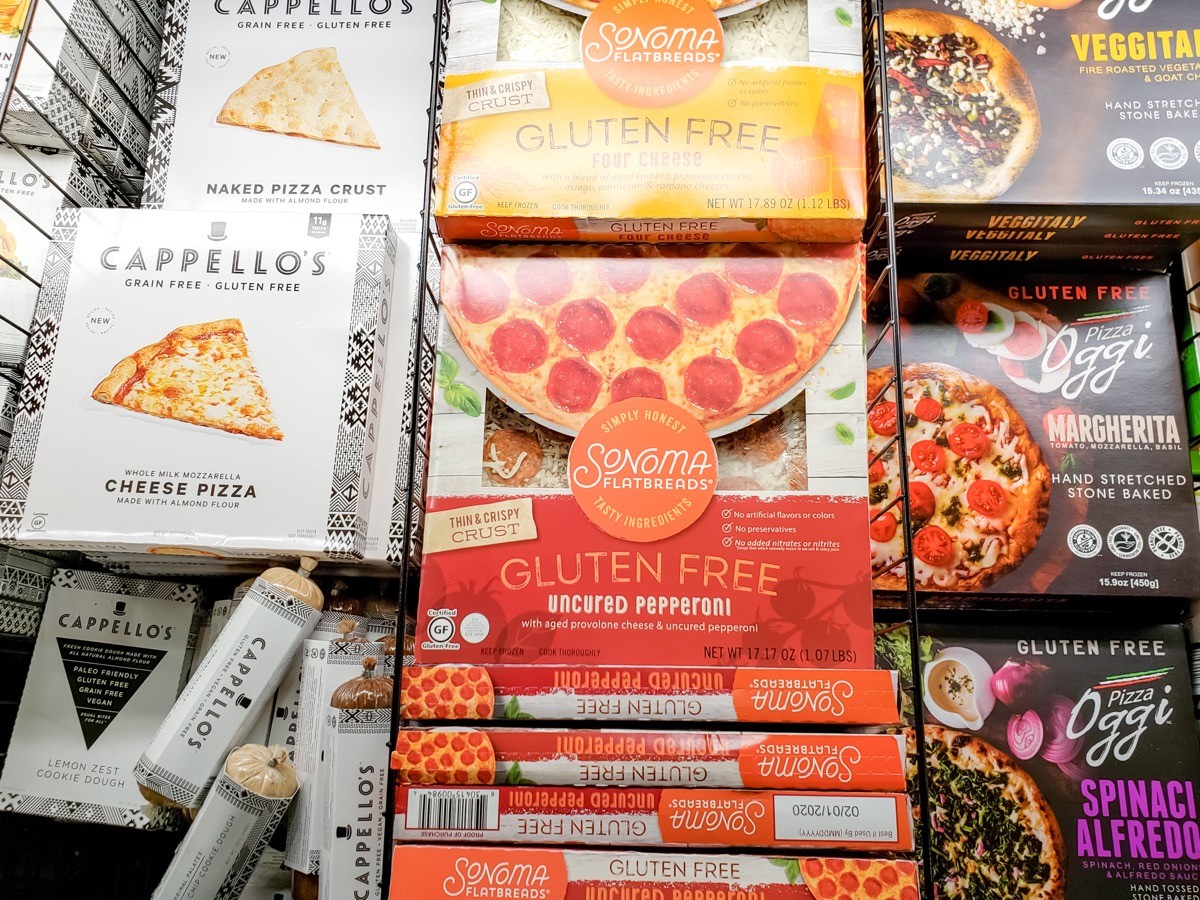
Gluten-free products “are necessary for those with gluten intolerance or celiac disease,” notes Best. They’ve also developed a reputation for being especially healthy, but this isn’t necessarily true.
“Many are full of empty calories from added sugar, fat, and refined carbohydrates,” she cautions. The same can be true for vegan products.
For optimal health, it’s important to read food labels and ingredient lists to choose minimally-processed products made with little or no added sugar, according to the National Institutes of Health (NIH).
7
Diet soda

Best Life recently reported on new research that found aspartame, the sugar alternative in diet sodas and other zero-sugar foods and drinks, can lead to an increased risk of heart attack and stroke over time. But the fake sugars in these low-calorie alternatives could also be causing weight gain.
“Switching from regular to diet soda may offer a short-term cut in calories, but your body won’t be fooled for long,” registered dietitian Susan Campbell, RD, LD, told Cleveland Clinic.
For example, a 2012 study found that artificial sweeteners cause your brain to crave other high-calorie foods just like regular sugar does.
Additionally, a 2013 study concluded that artificial sweeteners caused people’s insulin and blood glucose levels to rise, two factors associated with an increased risk of Type 2 diabetes.
8
Juices and smoothies
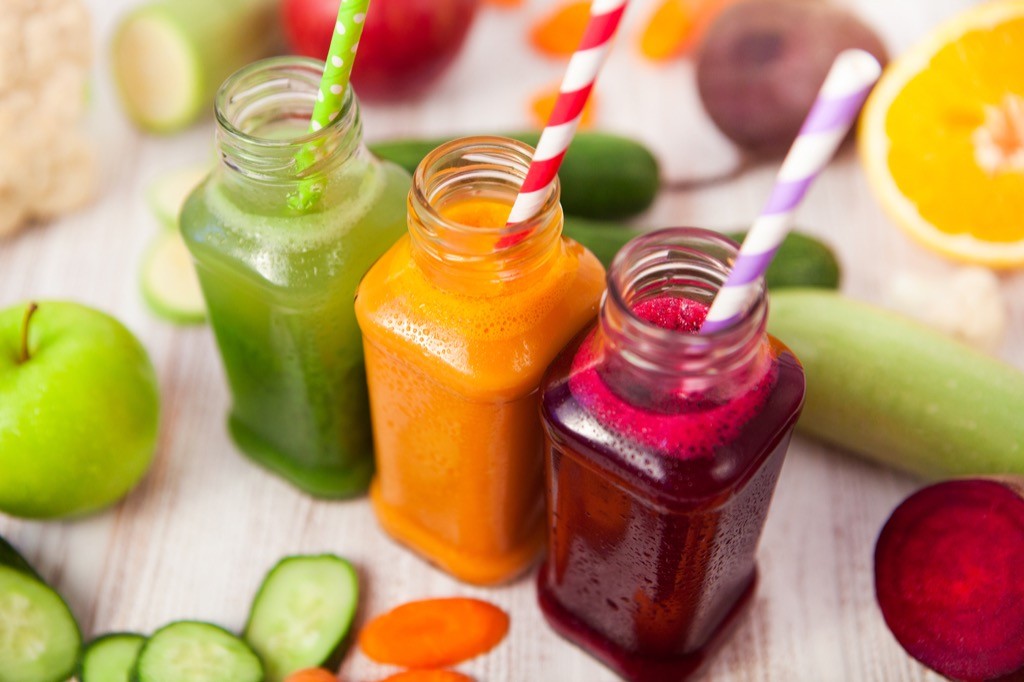
Juices and smoothies can be a healthy part of a balanced diet, but when consumed in excess or as part of a cleanse, they can unintentionally lead to weight gain.
“Juicing can lead to a higher intake of natural sugars found in fruits, potentially spiking blood sugar levels and triggering hunger and cravings for more sugary foods,” Lisa Richards, a nutritionist and author of The Candida Diet, previously told Best Life. “Large volumes of juice can provide a concentrated source of calories, and people may underestimate the calorie content of their beverages.”
Plus, when fruits and vegetables are juiced, it removes their fiber content, which is what helps you feel satiated.
Even more worrisome is that a new study published in the journal Nutrients found that following a juice cleanse for just three days can cause microbiome disruptions due to the lack of fiber, ultimately leading to inflammation and poor gut health.
9
Nuts
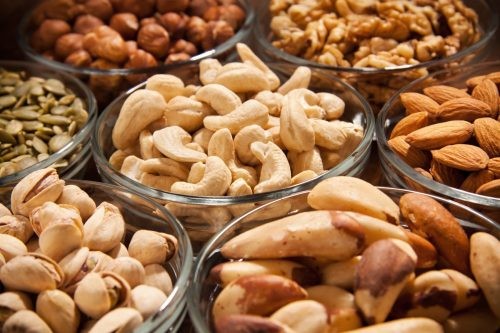
Nuts are high in healthy fats and protein but low in carbs, making them a heart-friendly snack that can help lower blood sugar.
However, portion control is key here because nuts are quite high in calories. According to the British Heart Foundation, it also depends what type of nut you eat.
“Nuts have a high fat content, so are high in energy. In most nuts this is mainly unsaturated fat: either polyunsaturated fats in walnuts and pine nuts, or monounsaturated fats in almonds, pistachios, pecans and hazelnuts, for example,” their experts write.
However, Brazil nuts, cashews, and macadamia nuts are all higher in saturated fat. “Too much of this can contribute to raised cholesterol levels, so only eat them occasionally,” they advise.
10
Bran muffins
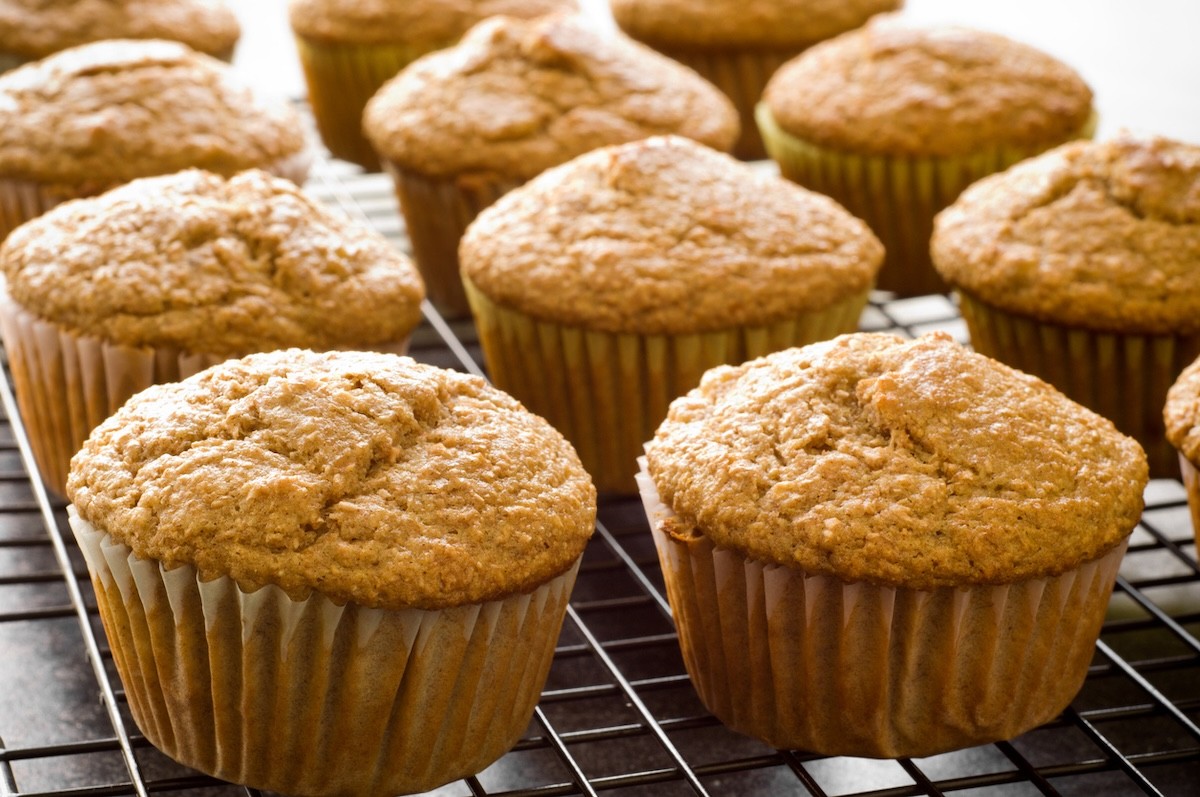
Baked goods made with “healthy” ingredients—for instance, muffins made with Greek yogurt, nuts and seeds, almond flour, or maple syrup—can also be a sneaky calorie bomb.
“They often contain butter, coconut oil, or other full-fat dairy products, which can increase their saturated fat content,” Graca says. “While these treats may offer some nutritional benefits, they can also have hidden fats that make them less healthy than they appear. Being cautious with portion sizes or using lower-fat alternatives can help balance your intake.”